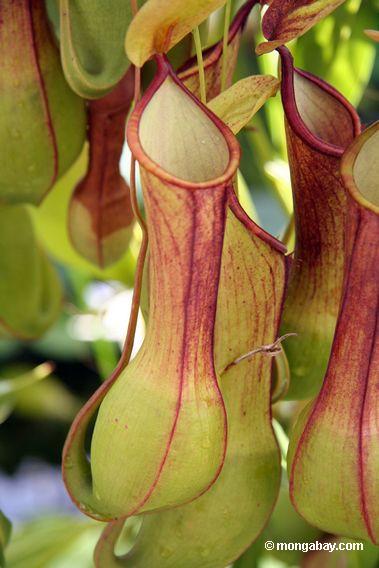
- A notch in a tree will remain the same distance from the ground as the tree grows.
- Banana oil is made from petroleum.
- 84% of a raw apple and 96% of a raw cucumber is water.
- The largest single flower is the Rafflesia or “corpse flower”. They are generally 3 feet in diameter with the record being 42 inches.
- Onions contain a mild antibiotic that fights infections, soothes burns, tames bee stings and relieves the itch of athletes foot.
- Quinine, one of the most important drugs known to man, is obtained from the dried bark of an evergreen tree native to South America.
- The rose family of plants, in addition to flowers, gives us apples, pears, plums, cherries, almonds, peaches and apricots.
- No species of wild plant produces a flower or blossom that is absolutely black, and so far, none has been developed artificially.
- Nutmeg is extremely poisonous if injected intravenously.
- The bright orange color of carrots tell you they are an excellent source of Vitamin A which is important for good eyesight, especially at night. Vitamin A helps your body fight infection, and keeps your skin and hair healthy.
- A plant’s stem appears and grows upward shortly after the primary root appears. It continues to grow above ground level.
- Water and minerals flow upward through the roots into the stem of the plant and then into the leaves of the plant.
- Pistils have three parts – the stigma, the style, and the ovary.
- Petals are usually colorful, and they attract insects and birds that help with pollination.
- Fruit is really the part of a flower in which seeds grow. Cherries, apples, and even milkweed pods are fruit.
- Buds are small swellings on a plant from which a shoot, leaf, or flower usually develops.
- The primary root is the first thing to sprout from a seed, and it grows downward.
- A seed contains its own food supply, which helps the sprouting plant as it begins its new life.
- Roots are covered with root hairs that absorb water and minerals.
- Grapes and clematis have stems that climb with tendrils, which hold onto a surface, as the stems get longer.
Avocados have the highest calories of any fruit at 167 calories per hundred grams.
-
The California redwood – coast redwood and giant sequoia – are the tallest and largest living organism in the world.
-
One bushel of corn will sweeten more than 400 cans of pop.
-
Nutmeg is extremely poisonous if injected intravenously.
-
The Pitcher-plant is a carnivorous plant, a meat eater. Carnivorous plants usually live in nitrogen poor soils. They have ‘learned’ to augment the inadequate nitrogen available in the soil by capturing and consuming insects!
-
40% of prescripition drugs dispensed in the U.S. have active ingredients derived from plants, animals or microorganisms, many of them from forests.
-
The hurricane plant has holes in its leaves, which keep it from being destroyed by wind.
-
The canopy of a rainforest is so thick, only one percent of sunlight reaches the ground.
-
A banana is about 75 percent water.
-
A single large tree can release up to 400 gallons of water into the atmosphere each day.
-
Rafflesia flowers attract pollinating flies by looking and smelling like rotten meat.
-
One acre of trees absorbs enough carbon dioxide per year to match that emitted by driving a car 26,000 miles.
-
The saguaro cactus of the Arizona Desert grows less than one inch in it’s first 10 years.
-
In the 1800’s an Eggplant was known as a “mad apple” and believed to be poisonous.
-
One cord of wood can make 7 and a half million toothpicks.

No comments:
Post a Comment